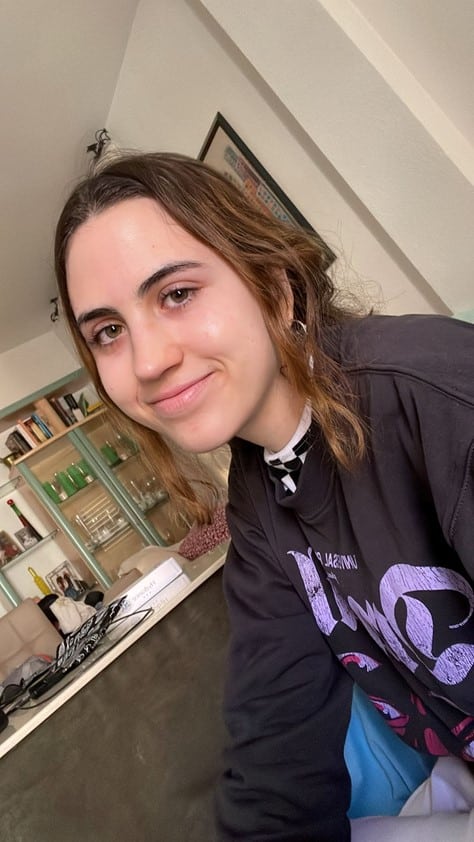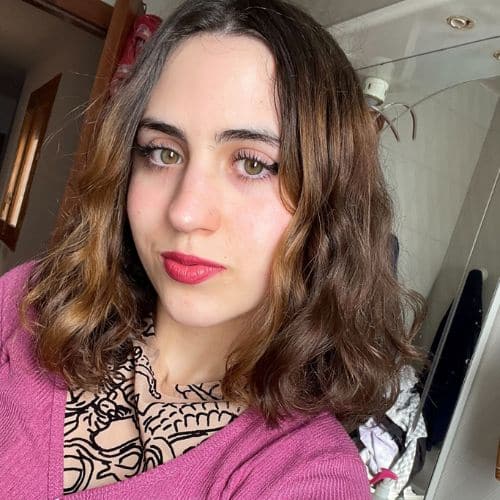Contents
Hello! Who are you?
Hi there! I’m Marina, a former Fine Arts student and current employee and sociocultural animator in the hospitality sector, as well as a particular English professor for kids.
I know it may have seemed too long to read, nevertheless, I work as many things as I can (my savings need an extra so long as I’m healthy and active enough to have a job).
Turning to another more interesting topic, I’m naturally from Spain, my beloved and sunny country, (even though I lack some vitamin D). I was born close to the only desert existing in Europe, the Tabernas desert, which you can see below:

Additionally, I’ve been in love with dogs since my childhood and I read whenever I find a comfy seat.
I could say now that I feel happy, however much, I would probably affirm that I’m satisfied with my life; due to the fact that, personally, happiness is a pretty ephemeral state, and contentment can be experienced for a longer time.
💡 By the way: Do you find it hard to be happy and in control of your life? It may not be your fault. To help you feel better, we’ve condensed the information of 100’s of articles into a 10-step mental health cheat sheet to help you be more in control. 👇
What is your struggle and when did it start?
My depressive symptoms and panic attacks started back when I was 15/16 years old. Before I could realize it, I had turned into a young adolescent after quarantine’s end with huge insecurities, trauma, and future career decisions to make.
Honestly, I will not lie to any of you, it was a custom-made hell. Hormones at that time would not be of any help, not to mention my environment’s confusion and hate instead of welcoming support.
Over time, I had my ups and downs, but I never was truly cheery with my identity and personality. Thus, not until I had hit rock bottom with depression and anxiety at 18 years old did I get to the conclusion that the best option for me was acceptance and compassion, a rough path to follow sometimes.
After I had reinvented myself at 16 years old due to the panic attacks, I felt that as an 18-year-old there couldn’t exist more chances for me. I had disappointed my family since my bad decisions, (which in fact weren’t that dramatically bad), yet I still felt distraught and like a failure.
By the time I knew what I wanted from my professional life, people told me it would make me stressed and that they wouldn’t support me in case I decided to enter this career path.
Obviously, it made me abandoned and rejected, and by the time I fully recovered from depression, I talked with my parents about this topic.
Although we came to an agreement and everything became better, nowadays some situations still trigger overthinking, shame, and fear. As a result, I’m currently going to therapy, but I’m not being very vocal about it or about my past struggles.
I’m learning to deal with my feelings slowly, mind you properly; hence it may be difficult for me on some occasions to talk with strangers or open myself completely with my loved ones about this topic. Despite this, personally, it seems right, and the best thing to do: focus on healing until I get to be 100% me.
How did this struggle make you feel at your worst moments?
As long as I was discouraged about life, my interpersonal relationships, and my abilities exponentially decreased, I wouldn’t be able to get out of bed lots of mornings.
Yet, even as I was being helped by my psychologist, I hadn’t found a meaning or purpose to live. I could exclusively focus on thinking if only I were smarter or braver, I would be happier.
These types of feelings and thoughts kept me on a vicious circle of crying and complaining about my reality, because everyone had left me alone (or that is how I viewed it, it was real that they had cut me off).
I used to have a large amount of “friends”, notwithstanding that, in the first second they noticed I was mentally bad or going through a difficult stage, they abandoned and rejected me.
Consequently, I turned into a solitary and lonely person (my biggest fear came true) and I just exploded. Those couple of months were hugely horrible, in a way I could not comprehend then.
Paradoxically, some people assumed that I was perfectly fine when I, on the contrary, was utterly lost in the world, with zero motivation to keep living, and alone.
As days passed, I just grew weaker and weaker, my grades in college started to suffer too and my mind could only be categorized as the worst enemy of sorts.
I don’t want to exaggerate but for weeks I slept only 5/6 hours a day when I managed my head to be “pleasant”, or I didn’t sleep at all. I recall myself going to class with 2 hours of sleep, bringing a plastic minimalist sculpture to my professor, and thinking that I should be dead.
This suicidal edge coupled with stress, anxiety, and loneliness made me stop working as a human being. In just two months I had spiraled down into the darkest hole which has ever existed for me. There didn’t exist Marina anymore, merely a depressive and neurotic copy of her, who was unable to laugh and sleep.
👉 Share your story: Help thousands of people around the world by sharing your own story. We would love to publish your interview and have a positive impact on the world together. Learn more here.
Was there a moment when you started to turn things around?
At first, I tried to sleep more and go to class, the latter was the reason behind 50% of my suffering because I had been misled: My career was not for me and I didn’t fit in there, regardless of the friends I made. As I already had discovered it, I went to the dean’s office and he just recommended that I drop out of college.
I took his advice, but still, my family didn’t approve of my decision. Accordingly, I had to stay in the city studying something I started to despise for 2 months.
It could be true that my mindset and perspective were not quite helpful either. I tried to be optimistic and I just couldn’t find any good thing to be proud of, which can be described as absolutely miserable.
I realized I was pursuing someone else’s dream, instead of mine, on account of what I have been told and taught, and I began to wonder if I would be good enough to achieve my dream.
At the very start, the negative answer predominated, though, deep down, I thought I was enough, maybe not for all the others, but for me.

What steps did you take to overcome your struggle?
My first piece of advice would be not to obsess over your struggle and not to magnify it. We, as humans, are much more than our issues, so we shouldn’t treat ourselves badly for suffering or for any past trauma.
Everybody has gone through something tough. Assuming that, would you insult your best friend for being a victim of sexual assault? No, in that case, don’t let your negative self win.
Furthermore, what really helped me was to take life as a beautiful journey, instead of an awful one filled with stress. For instance, I conscientiously enjoyed my favorite songs, my material childhood memories, having a cup of tea, watching the sky…
In the meantime, we always can include these little moments of keep while we keep fighting depression and anxiety (or the risk of entering that cycle again).
Have you shared any of this with people around you in real life?
I have discussed my depression and anxiety symptoms with my family and my most supportive friend, the one who has accompanied me through almost every step. I also talked about it with one classmate, and I believe it changed his mind about me.
As I have previously stated, I preferred not to share my intimate part with my colleagues, teachers, and acquaintances. Since I’m aware of the intrinsically poor cultural perception of going to a psychologist in Spain, (they actually refer to it as “shrink”), the most beneficial option to me was keeping my private topics under my hat.
If you could give a single piece of advice to someone else that struggles, what would that be?
I wish I had known earlier the power of thoughts, a positive mindset, and an inspiring environment to live a plentiful life.
Besides, be careful who you’re friends. I learned that part of my lack of self-esteem was influenced by some friends, and the other part was damaged by trauma and a chaotic relationship with social media.
What have been the most influential books, podcasts, YouTube channels, or other resources for you?
- Atomic Habits by James Clear: This book is about how you can change your destructive habits, the practical exercises it provides will get you covered. (Another motive to read it is the amusing writer’s tone, which makes the reading more entertaining).
- For my Spaniards and Latin people, this video changed me for the better and fostered my confidence.
- Human behaviour and thought patterns can be controlled to overcome uncertainty, adversity and inspire people (by being committed to ourselves): Youtube.
- Any motivational or inspiring TED Talk might resonate with you. It contains plenty of powerful habits that you have the chance to implement and can be advantageous.
Is there anything else you think we should have asked you?
I would love to talk more about the cost of having a mental illness or the stigma towards speaking about it publicly. In Spain, it’s rare to hear someone around you saying that they go to therapy.
What made my mental struggles more difficult was the added costsDeepening into the negatives of experiencing these types of emotional instability or mental problems, the worst for me was the expensive service you have to pay for in order to heal yourself.
In Spain, the public healthcare system is made to only treat you when you have attempted suicide. Or if you have already been on the “psychologists’ waiting list” for six months minimum. It isn’t odd then that the suicide rate has experienced the greatest rise in the last decade between 15 and 19 years.
Due to the pathetic circumstances mentioned before, I saw myself forced to look for a private professional, since my public one didn’t want to help me recover. She firmly said that I was being too pessimistic and that I should pay for therapy at another place because she was unfit to take my case.
Where can we go to learn more about you?
If you do want to keep an eye on me because you have identified with my story, you can follow me on Instagram or Twitter.
- My Instagram (mental health-related and healthy lifestyle).
- My Twitter, where I often let my tongue loose about books.
Remember that despite my socials being in my native language, you can always chat with me in English. I’m pretty funny and interested in knowing more cool people, like the person who’s reading this… It would be a pleasure for me to get to meet and help somebody who has dealt with the same troubles as me.
💡 By the way: If you want to start feeling better and more productive, I’ve condensed the information of 100’s of our articles into a 10-step mental health cheat sheet here. 👇
This Cheat Sheet Will Help You Be Happier and More Productive
Thrive under stress and crush your goals with these 10 unique tips for your mental health.
Want more interviews?
Continue reading our inspiring case studies and learn how to overcome mental health struggles in a positive way!
Want to help others with your story? We would love to publish your interview and have a positive impact on the world together. Learn more here.



